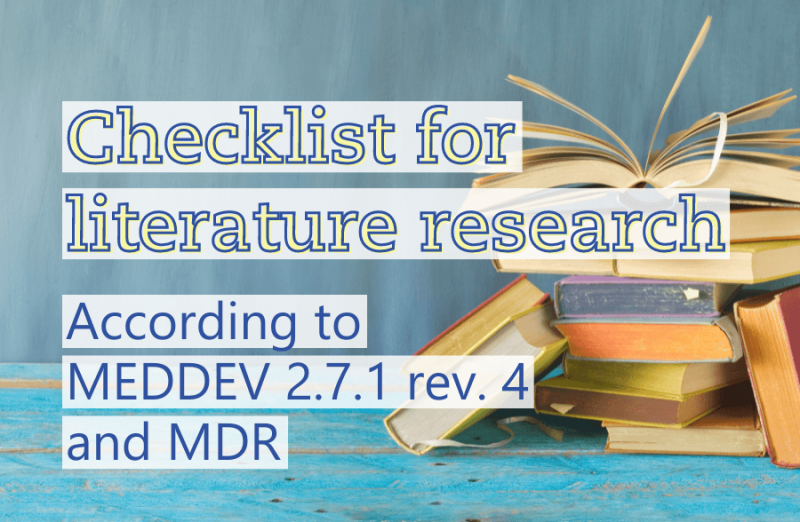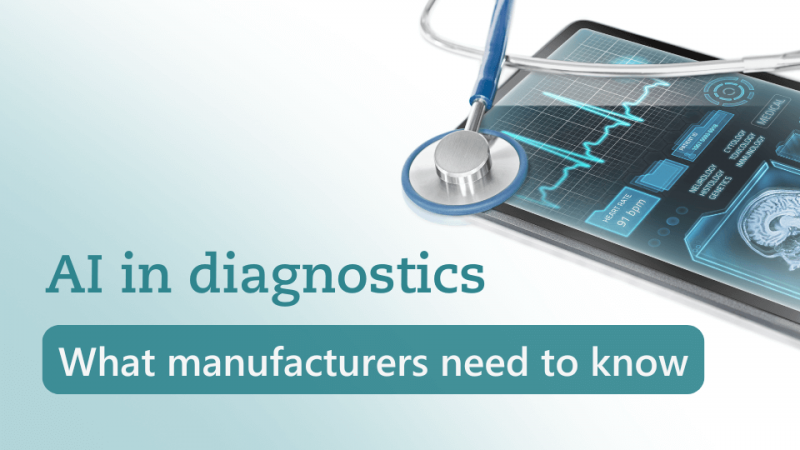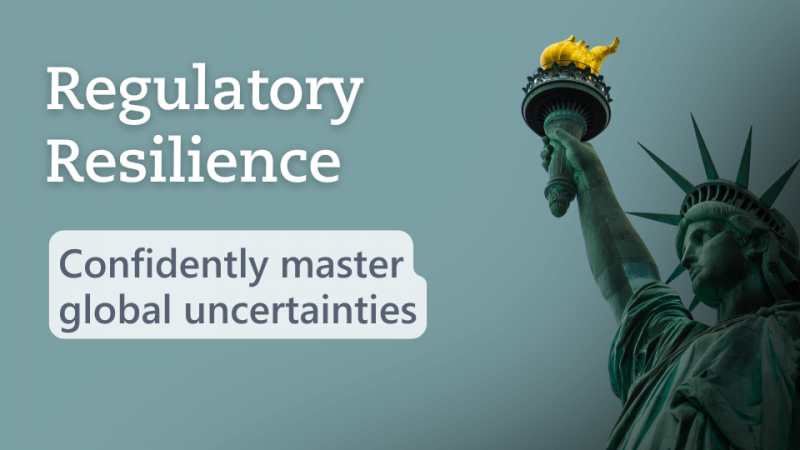Checklist: How to successfully conduct a literature search according to MEDDEV 2.7.1 rev. 4 and MDR
02/05/2023
Do you have any questions about the article or would you like to find out more about our services? We look forward to hearing from you!Make a non-binding enquiry now
The MDR requires medical device manufacturers to conduct a planned, systematic literature search as part of the Clinical Evaluation and Post-Market Surveillance (PMS) and Post Market Clinical Follow-Up (PMCF). How do manufacturers conduct literature searches in an MDR-compliant manner? This article provides practical recommendations from database selection to selection criteria - including some insider tips.A literature search according to Regulation (EU) 2017/745 (MDR) has two objectives: To collect data on the medical device under evaluation and to find information describing the State of the Art (SOTA) of the medical field under consideration. Thus, it contributes to updating the risk-benefit assessment and provides a basis for presenting the state of the art.How does a literature search according to MDR succeed in practice? We have collected frequently asked questions and answered them from our point of view.
In the first step, the publications found are checked for relevance based on their abstract. For this purpose, (pre)defined selection criteria are used. They contain ...
According to the MEDDEV, the selected, relevant publications must be evaluated based on (predefined) criteria (the "appraisal" criteria). The respective full text (to be acquired) of the selected publications is the basis of the appraisal. The publications considered in the Clinical Evaluation are assigned to different levels of evidence - for example, based on the type of publication, if applicable, the design of the clinical trial, the case number size, and the similarity of the medical device under consideration to the one being evaluated. This classification helps in evaluating the data or presenting the state of the art, especially in the case of conflicting information. Key arguments should be based on highly ranked publications.Modern software solutions can help save time and increase efficiency in many of the steps described above. A variety of solutions are available for this purpose: From comprehensive databases with integrated statistical functions and intuitive interface design to the integration of artificial intelligence to support users in the selection and evaluation of publications.
Best Regards
 Marie-Laure Castelain
Marie-Laure Castelain
Clinical Evaluation, PMS, PMCF - is one literature search enough for all of them?
The MDR mentions the literature search as a tool several times:- PMS (Annex III, 1.1),
- PMCF (Annex XIV, Part B, point 6.2) and
- Clinical Evaluation (Article 61, 3.).
Checklist for practice: Search strategy according to MEDDEV 2.7/1 rev. 4
In terms of the practical implementation of an MDR-compliant literature search, this checklist provides support by answering common questions.1. Databases
There is no consensus on the number and type of databases to search. However, according to the MEDDEV guidance document (see Appendix A4), it is not sufficient to search only MEDLINE or PubMed. At least one other database besides PubMed/MEDLINE should be used - for example:- Embase,
- Cochrane Database of Systematic Reviews,
- ClinicalTrials.gov,
- Livivo,
- EBSCO,
- Cochrane CENTRAL trials register,
- WHO International Clinical Trials Registry Platform (ICTRP),
- Prospero international prospective register of systematic reviews.
2. Search terms
After you have decided on the databases, in the next step you should define suitable search terms. Their formulation is crucial for the quality and scope of the search. They should consider both the important aspects of the medical device’s clinical application and the specificity of the search:- To find clinical data relevant to the product, it makes sense to include both the brand name and the manufacturer’s name in the search terms.
- When searching for State of the Art (SOTA) information, it is recommendable to use terms
- from the relevant medical field,
- for the intended purpose,
- for the indications, and
- that describe the product type, aspects of performance and safety of the medical device being evaluated, and marketing pledges.
- In addition, it is useful to search for brand and manufacturer names of similar and like products.
3. Selection versus appraisal
Finally, it is about the selection and appraisal of the publications. What is the difference?SelectionIn the first step, the publications found are checked for relevance based on their abstract. For this purpose, (pre)defined selection criteria are used. They contain ...
- either exclusion criteria only: What is not excluded is included.
- or inclusion and exclusion criteria, which must not contradict each other.
According to the MEDDEV, the selected, relevant publications must be evaluated based on (predefined) criteria (the "appraisal" criteria). The respective full text (to be acquired) of the selected publications is the basis of the appraisal. The publications considered in the Clinical Evaluation are assigned to different levels of evidence - for example, based on the type of publication, if applicable, the design of the clinical trial, the case number size, and the similarity of the medical device under consideration to the one being evaluated. This classification helps in evaluating the data or presenting the state of the art, especially in the case of conflicting information. Key arguments should be based on highly ranked publications.Modern software solutions can help save time and increase efficiency in many of the steps described above. A variety of solutions are available for this purpose: From comprehensive databases with integrated statistical functions and intuitive interface design to the integration of artificial intelligence to support users in the selection and evaluation of publications.
Conclusion
As part of the Clinical Evaluation, PMS and PMCF, MDR requires manufacturers to conduct a systematic literature search. These searches can be bundled under certain conditions. A meaningful search strategy according to MEDDEV 2.7/1 rev. 4 requires a careful selection of databases and appropriate search terms. Finally, meaningful selection and appraisal criteria for the publications found must be defined and documented.Are you currently facing the challenge of conducting a systematic literature search as part of the clinical evaluation of your new medical device? We will be happy to support you in your request. Even if you have questions about another complex topic in the field of clinical affairs, our team is there for you. Together with you, our experts will find the best answers to your individual question. Our initial consultations are non-binding and free of charge.Best Regards
Our blog posts are researched and created with the utmost care, but are only snapshots of the regulations, which are constantly changing. We do not guarantee that older content is still current or meaningful. If you are not sure whether the article you have read on this page still corresponds to the current state of regulation, please contact us: we will quickly place your topic in the current context.

Medical Device Expert
Clinical Affairs & PMCF



